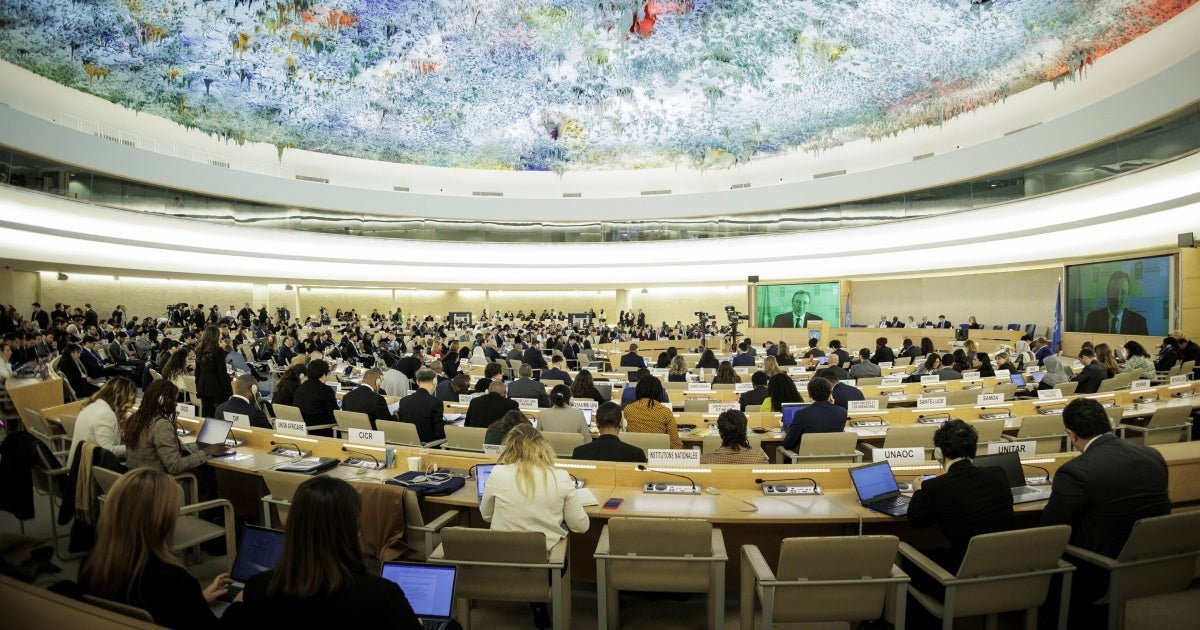UN Rights Council Boosts Scrutiny of North Korea
UN Rights Council Boosts Scrutiny of North Korea Human Rights Watch


The United Nations Human Rights Council Adopts Resolution on North Korean Human Rights

The North Korean human rights movement achieved a significant victory on April 4 when the United Nations Human Rights Council (UNHRC) adopted a resolution ensuring continued scrutiny of North Korea’s atrocious rights record.
Renewed Mandate and Comprehensive Report
The resolution renews the mandate of the UN special rapporteur on the Democratic People’s Republic of Korea (North Korea) and requests the Office of the UN High Commissioner for Human Rights to prepare its first comprehensive report on the North Korean human rights situation since the Commission of Inquiry (COI) published its landmark report in 2014.
The new resolution also allocates additional resources for the high commissioner’s office to focus on criminal accountability for North Korea’s rights violations and emphasizes the link between North Korea’s weapons program, international peace and security, and human rights.
Importance and Commitment
This resolution is the UNHRC’s most ambitious action on North Korea since 2016 and holds immense importance for victims of serious abuses in one of the world’s most isolated and repressive countries. In contrast to Russia’s veto at the UN Security Council on March 28, which disbanded the Panel of Experts on North Korea, this resolution demonstrates the commitment of concerned countries to ensure accountability.
Building on Past Recommendations
The 2014 COI report was a watershed moment, exposing egregious rights abuses in North Korea. The upcoming report mandated by the UNHRC, scheduled for publication in September 2025, will build on the COI’s recommendations. It will provide a platform for North Korean victims, particularly those who have suffered since Kim Jong Un assumed power in December 2011, and amplify their stories on the international stage.
By highlighting the connection between North Korea’s weapons development and human rights, the upcoming report will remind governments that security cannot be addressed in isolation from underlying rights abuses.
Call for Greater Support
While the UNHRC resolution is a crucial step, North Korea’s victims are entitled to greater support from international institutions. The UN General Assembly and Security Council should also intensify their scrutiny of North Korea. This includes exploring connections between rights abuses and weapons proliferation, as well as the need to hold rights violators accountable.
SDGs, Targets, and Indicators
| SDGs | Targets | Indicators |
|---|---|---|
| SDG 16: Peace, Justice, and Strong Institutions | Target 16.3: Promote the rule of law at the national and international levels and ensure equal access to justice for all | – Adoption of a resolution ensuring continued scrutiny of North Korea’s human rights record by the UNHRC – Renewal of the mandate of the UN special rapporteur on North Korea – Preparation of a comprehensive report on the North Korean human rights situation by the Office of the UN High Commissioner for Human Rights – Increase in resources for the high commissioner’s office to focus on criminal accountability for North Korea’s rights violations |
| SDG 16: Peace, Justice, and Strong Institutions | Target 16.7: Ensure responsive, inclusive, participatory, and representative decision-making at all levels | – Scrutiny of North Korea by the UN General Assembly and Security Council – Exploration of connections between rights abuses and weapons proliferation – Holding rights violators accountable |
1. Which SDGs are addressed or connected to the issues highlighted in the article?
- SDG 16: Peace, Justice, and Strong Institutions
The article discusses the adoption of a resolution by the UNHRC to ensure continued scrutiny of North Korea’s human rights record. This aligns with SDG 16, which focuses on promoting peace, justice, and strong institutions.
2. What specific targets under those SDGs can be identified based on the article’s content?
- Target 16.3: Promote the rule of law at the national and international levels and ensure equal access to justice for all
- Target 16.7: Ensure responsive, inclusive, participatory, and representative decision-making at all levels
The article highlights the renewal of the mandate of the UN special rapporteur on North Korea, the preparation of a comprehensive report on the North Korean human rights situation, and the focus on criminal accountability for North Korea’s rights violations. These actions contribute to achieving Target 16.3. Additionally, the article calls for increased scrutiny of North Korea by the UN General Assembly and Security Council, exploration of connections between rights abuses and weapons proliferation, and holding rights violators accountable, which are relevant to Target 16.7.
3. Are there any indicators mentioned or implied in the article that can be used to measure progress towards the identified targets?
- – Adoption of a resolution ensuring continued scrutiny of North Korea’s human rights record by the UNHRC
- – Renewal of the mandate of the UN special rapporteur on North Korea
- – Preparation of a comprehensive report on the North Korean human rights situation by the Office of the UN High Commissioner for Human Rights
- – Increase in resources for the high commissioner’s office to focus on criminal accountability for North Korea’s rights violations
- – Scrutiny of North Korea by the UN General Assembly and Security Council
- – Exploration of connections between rights abuses and weapons proliferation
- – Holding rights violators accountable
These indicators can be used to measure progress towards the identified targets. The adoption of a resolution, renewal of the mandate, preparation of a comprehensive report, and allocation of increased resources demonstrate concrete actions taken to promote the rule of law and ensure equal access to justice. Scrutiny by the UN General Assembly and Security Council, exploration of connections between rights abuses and weapons proliferation, and holding rights violators accountable indicate efforts towards responsive, inclusive, participatory, and representative decision-making.
4. Table: SDGs, Targets, and Indicators
| SDGs | Targets | Indicators |
|---|---|---|
| SDG 16: Peace, Justice, and Strong Institutions | Target 16.3: Promote the rule of law at the national and international levels and ensure equal access to justice for all | – Adoption of a resolution ensuring continued scrutiny of North Korea’s human rights record by the UNHRC – Renewal of the mandate of the UN special rapporteur on North Korea – Preparation of a comprehensive report on the North Korean human rights situation by the Office of the UN High Commissioner for Human Rights – Increase in resources for the high commissioner’s office to focus on criminal accountability for North Korea’s rights violations |
| SDG 16: Peace, Justice, and Strong Institutions | Target 16.7: Ensure responsive, inclusive, participatory, and representative decision-making at all levels | – Scrutiny of North Korea by the UN General Assembly and Security Council – Exploration of connections between rights abuses and weapons proliferation – Holding rights violators accountable |
Behold! This splendid article springs forth from the wellspring of knowledge, shaped by a wondrous proprietary AI technology that delved into a vast ocean of data, illuminating the path towards the Sustainable Development Goals. Remember that all rights are reserved by SDG Investors LLC, empowering us to champion progress together.
Source: hrw.org

Join us, as fellow seekers of change, on a transformative journey at https://sdgtalks.ai/welcome, where you can become a member and actively contribute to shaping a brighter future.







